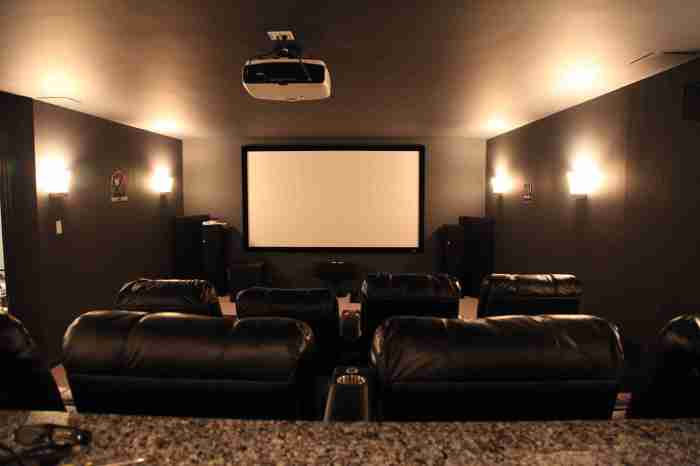How do I invest in theater room blockchain? This intriguing question opens the door to a fascinating exploration of how blockchain technology, traditionally associated with cryptocurrencies, is transforming the landscape of real estate investment, specifically within the niche market of high-end home theaters. We’ll delve into the potential benefits of using blockchain for increased transparency, security, and efficiency in theater room development and investment, examining both the opportunities and challenges this emerging technology presents.
This guide will explore the fundamental principles of blockchain and its application to theater room investment. We will examine hypothetical blockchain platforms designed for this purpose, analyze the legal and regulatory considerations, and detail the steps involved in participating in such investments. A critical evaluation of the risks and rewards will be provided, offering a comprehensive overview to help potential investors make informed decisions.
Understanding Blockchain Technology in the Context of Theater Room Investment

Blockchain technology, initially known for its role in cryptocurrencies like Bitcoin, offers a decentralized and transparent system for recording and verifying transactions. This technology’s potential extends far beyond digital currencies, presenting exciting possibilities for various industries, including the investment and management of theater room projects. This section will explore how blockchain can enhance security, transparency, and efficiency in this specific context.Blockchain’s fundamental principle lies in its distributed ledger technology.
Instead of relying on a central authority to manage transactions, a blockchain uses a network of computers to record and verify each transaction. This decentralized nature makes the system highly secure and resistant to manipulation. Each transaction, once recorded, becomes a permanent part of the blockchain, creating an immutable record of all activity. This immutability is crucial for building trust and transparency in financial transactions.
Beyond its security features, blockchain can also streamline processes, reduce costs, and increase efficiency.
Blockchain’s Enhancement of Security and Transparency in Theater Room Investments
The inherent security and transparency of blockchain technology offer significant advantages for theater room investments. Traditional investment methods often involve intermediaries, increasing the risk of fraud and delays. Blockchain eliminates many of these intermediaries, creating a more direct and secure pathway for investment. The immutable record of all transactions provides a verifiable audit trail, enhancing accountability and reducing the potential for misappropriation of funds.
For example, investors can track precisely how their contributions are being utilized, fostering greater trust between investors and project managers. Furthermore, smart contracts, discussed further below, automate many aspects of the investment process, further reducing the risk of human error or intentional manipulation.
Comparison of Traditional and Blockchain-Based Investment Methods for Theater Room Projects
Traditional methods of investing in theater room projects typically involve complex legal agreements, numerous intermediaries (such as banks and lawyers), and potentially opaque financial reporting. This can lead to delays, increased costs, and a lack of transparency for investors. Blockchain-based alternatives, on the other hand, offer a more streamlined and transparent process. Smart contracts can automate many of the legal and financial aspects of the investment, reducing the need for intermediaries and accelerating the investment process.
The decentralized nature of the blockchain also reduces the risk of single points of failure, making the system more resilient to fraud and disruptions. A real-world example would be comparing a traditional equity investment in a theater production versus using a blockchain-based platform to invest fractional ownership through tokenization. The latter offers greater transparency and liquidity.
Utilization of Smart Contracts in Managing Theater Room Investments
Smart contracts are self-executing contracts with the terms of the agreement written directly into lines of code. They automate many aspects of the investment process, eliminating the need for intermediaries and increasing efficiency. In the context of theater room investments, smart contracts can be used to automate payments to contractors, distribute profits to investors based on predefined agreements, and manage the release of funds based on the achievement of milestones.
For example, a smart contract could automatically release funds to a construction company upon completion of a specific stage of the theater room build, as verified by independent inspectors. This eliminates the need for manual verification and payment processing, reducing delays and improving efficiency. Furthermore, smart contracts can be programmed to enforce specific terms and conditions, ensuring compliance and reducing the risk of disputes.
Exploring Potential Blockchain-Based Theater Room Investment Platforms

The integration of blockchain technology presents exciting new avenues for investment in theater room projects, offering increased transparency, security, and efficiency compared to traditional methods. A blockchain-based platform can revolutionize how investors participate in the development and operation of these unique entertainment spaces. This section explores the design of a hypothetical platform and examines the potential benefits and drawbacks of this approach.
Hypothetical Blockchain Platform for Theater Room Investment
This hypothetical platform, tentatively named “StageChain,” would utilize a smart contract system to manage investment, revenue sharing, and governance. Investors could purchase fractional ownership of a theater room project through the platform using cryptocurrency. Smart contracts would automatically distribute profits based on each investor’s share, ensuring transparency and minimizing the risk of disputes. The platform would also incorporate a decentralized autonomous organization (DAO) structure, allowing investors to collectively make decisions regarding the theater room’s operations and future development.
Key features would include a secure digital wallet for investors, a transparent ledger tracking all transactions and ownership details, and a user-friendly interface for managing investments and accessing project updates. StageChain would aim to foster a community of investors and stakeholders, fostering collaborative decision-making and ensuring the long-term success of the projects.
Benefits and Drawbacks of Blockchain-Based Theater Room Investment
The use of blockchain technology for theater room investment offers several potential advantages. However, it also presents certain challenges that need careful consideration.
- Benefits: Increased transparency and security of transactions, reduced reliance on intermediaries, fractional ownership enabling greater accessibility for smaller investors, automated profit distribution, and enhanced governance through a DAO.
- Drawbacks: Potential for regulatory uncertainty, volatility of cryptocurrency markets, technical complexity for some investors, scalability issues with large-scale projects, and the need for robust security measures to prevent hacking or fraud.
Examples of Adaptable Existing Blockchain Platforms
Several existing blockchain platforms could be adapted for theater room investment. For example, platforms built on Ethereum, known for its robust smart contract functionality, could be utilized to create tokens representing ownership shares in a theater room project. Polygon, a scaling solution for Ethereum, could help address potential scalability issues. Furthermore, platforms specializing in security token offerings (STOs) could provide a framework for regulated investment in theater room projects.
Each platform would require careful customization to suit the specific needs of the theater room investment context. Existing crowdfunding platforms, such as Kickstarter or Indiegogo, could also integrate blockchain technology to improve transparency and accountability.
The Role of Decentralized Finance (DeFi) in Theater Room Investments
Decentralized finance (DeFi) protocols could play a significant role in facilitating theater room investments via blockchain. For instance, DeFi lending platforms could provide investors with alternative financing options, while DeFi yield farming strategies could generate additional returns for investors. The use of stablecoins could help mitigate the volatility associated with cryptocurrency investments. However, it’s crucial to acknowledge the risks involved in DeFi, such as smart contract vulnerabilities and the potential for impermanent loss.
Careful due diligence and risk management are essential when integrating DeFi into a blockchain-based theater room investment platform.
Analyzing the Legal and Regulatory Landscape of Blockchain-Based Theater Room Investments

Investing in theater rooms using blockchain technology presents a novel approach, but navigating the legal and regulatory landscape is crucial for both investors and platform developers. The decentralized and often borderless nature of blockchain introduces complexities not present in traditional investment models. Understanding these complexities is essential for mitigating risk and ensuring compliance.
Potential Legal and Regulatory Challenges
The use of blockchain for theater room investments faces several potential legal hurdles. One key challenge lies in classifying the investment itself. Depending on the structure of the offering, the investment might be considered a security, subject to stringent regulations under securities laws such as the Howey Test in the United States. This test determines whether an investment contract exists based on factors like an investment of money in a common enterprise with the expectation of profits primarily from the efforts of others.
If classified as a security, the platform would need to register with relevant regulatory bodies, comply with disclosure requirements, and adhere to anti-fraud provisions. Another challenge is the potential for money laundering and terrorist financing, requiring platforms to implement robust Know Your Customer (KYC) and Anti-Money Laundering (AML) procedures. Furthermore, data privacy regulations like GDPR in Europe impose obligations on how personal data of investors is collected, processed, and stored.
Finally, the lack of clear, universally applicable legal frameworks for blockchain-based investments creates uncertainty and necessitates careful consideration of jurisdictional differences.
Implications of Existing Securities Laws and Regulations
Existing securities laws significantly impact blockchain-based theater room investment platforms. If the investment vehicle is deemed a security, the platform must comply with regulations governing the issuance, offering, and trading of securities. This includes adhering to registration requirements, providing comprehensive disclosures to potential investors, and ensuring compliance with ongoing reporting obligations. Failure to comply could result in significant penalties, including fines, injunctions, and even criminal prosecution.
The implications extend to the platform’s structure, operational procedures, and the level of transparency it must maintain to satisfy regulatory scrutiny. For example, a platform offering fractional ownership of a theater room might need to comply with regulations concerning real estate investment trusts (REITs) or similar structures depending on the jurisdiction.
Comparison of Regulatory Frameworks in Different Jurisdictions
Regulatory frameworks for blockchain-based investments vary considerably across jurisdictions. The United States, for instance, takes a relatively cautious approach, with the Securities and Exchange Commission (SEC) actively scrutinizing token offerings and other blockchain-based investment products. In contrast, some jurisdictions, such as Switzerland and Singapore, have adopted more progressive stances, developing specific frameworks to encourage innovation while maintaining investor protection.
The European Union is currently working towards a comprehensive regulatory framework for crypto-assets, aiming to strike a balance between fostering innovation and mitigating risks. This divergence in regulatory approaches necessitates careful consideration of the legal implications for platforms operating across borders or targeting investors in multiple jurisdictions. Each jurisdiction’s laws must be thoroughly analyzed before launching any platform.
Best Practices for Ensuring Legal Compliance
To ensure legal compliance, blockchain-based theater room investment platforms should prioritize several key practices. This includes conducting a thorough legal due diligence process to assess the regulatory landscape and determine the appropriate legal structure for the platform and the investment vehicle. Implementing robust KYC/AML procedures to prevent illicit activities is essential. Transparency is paramount; platforms should provide comprehensive and accurate disclosures to investors, including risks associated with the investment.
Seeking legal counsel specializing in securities law and blockchain technology is crucial to navigate the complexities of the regulatory environment. Regularly reviewing and updating compliance measures to adapt to evolving regulations and best practices is also vital. Finally, engaging with regulators early in the development process can foster a constructive dialogue and facilitate a smoother path to compliance.
Developing a Secure and Transparent Investment Process Using Blockchain

Blockchain technology offers a revolutionary approach to investment, particularly in complex projects like theater room development. Its inherent transparency and security features can significantly mitigate risks associated with traditional investment methods, fostering trust and efficiency among all stakeholders. This section details how blockchain can enhance security and transparency, provides a step-by-step guide for investors, Artikels the roles of participants, and illustrates key security measures.
Blockchain’s decentralized and immutable nature ensures that all transactions are recorded on a public ledger, accessible to all participants. This eliminates the possibility of single points of failure and reduces the risk of fraud or manipulation. Furthermore, smart contracts automate various stages of the investment process, enhancing efficiency and minimizing human error.
A Step-by-Step Guide for Blockchain-Based Theater Room Investments
Investing in a theater room project via blockchain typically involves several key steps. The specific process may vary depending on the platform used, but the general principles remain consistent.
- Account Creation and KYC/AML Compliance: Investors first need to create an account on the chosen blockchain platform. This often involves Know Your Customer (KYC) and Anti-Money Laundering (AML) checks to comply with regulatory requirements.
- Project Due Diligence: Thoroughly review the theater room project details, including the project’s financial projections, team expertise, and legal documents, all of which are accessible on the blockchain.
- Investment Selection and Token Purchase: Once comfortable with the project, investors can select their desired investment level and purchase tokens representing their stake in the project. This transaction is recorded on the blockchain, providing a verifiable record.
- Monitoring Progress and Receiving Updates: The blockchain platform often provides updates on the project’s progress, allowing investors to track milestones and financial performance in real-time.
- Token Redemption or Secondary Market Trading: Upon project completion or at predetermined intervals, investors can redeem their tokens for their share of the profits or trade their tokens on a secondary market (if available).
Roles of Participants in a Blockchain-Based Theater Room Investment Ecosystem
Several key participants contribute to a successful blockchain-based theater room investment ecosystem. Their collaborative roles ensure transparency and accountability.
- Investors: Provide capital for the project and receive tokens representing their investment.
- Developers: Manage the theater room project, from design and construction to operation and maintenance.
- Platform Providers: Create and maintain the blockchain platform used for investment transactions and project management.
- Auditors: Independently verify the financial records and project progress, ensuring transparency and accountability.
- Legal Counsel: Provides legal guidance and ensures compliance with relevant regulations.
Security Measures in Blockchain-Based Theater Room Investments
Several security measures can be implemented to protect against fraud and other risks. A robust security framework is essential for building investor confidence and ensuring the integrity of the investment process.
| Security Measure | Description | Implementation Details | Potential Risks Mitigated |
|---|---|---|---|
| Smart Contract Audits | Independent security audits of smart contracts to identify and address vulnerabilities. | Employ reputable blockchain security firms to conduct thorough code reviews and penetration testing. | Exploits, bugs, and unintended functionalities in smart contracts. |
| Multi-Signature Wallets | Require multiple parties to authorize transactions, reducing the risk of unauthorized access. | Implement a multi-signature scheme where several key holders must approve transactions. | Unauthorized fund transfers and fraudulent transactions. |
| KYC/AML Compliance | Verify investor identities to prevent money laundering and other illegal activities. | Integrate KYC/AML procedures into the platform’s registration process. | Money laundering, terrorist financing, and other illicit activities. |
| Data Encryption | Protect sensitive data, such as investor information and transaction details, using robust encryption methods. | Utilize industry-standard encryption protocols like AES-256 to safeguard data. | Data breaches and unauthorized access to sensitive information. |
Evaluating the Risks and Rewards of Investing in Theater Rooms via Blockchain: How Do I Invest In Theater Room Blockchain

Investing in theater rooms, traditionally a venture reliant on established real estate and financial models, is undergoing a potential transformation with the integration of blockchain technology. This presents both exciting opportunities and significant risks that require careful consideration before committing capital. This section will analyze the potential benefits and drawbacks of blockchain-based theater room investments compared to traditional methods, exploring the factors influencing success or failure and considering specific scenarios.Traditional theater room investments involve significant upfront capital, lengthy due diligence processes, and potential reliance on intermediaries like real estate agents and lawyers.
Returns are typically generated through rental income, appreciation of the property’s value, or eventual resale. Blockchain-based approaches, however, offer the potential for fractional ownership, increased transparency, and potentially faster transactions. However, they also introduce new risks associated with the volatility of the cryptocurrency market and the relative novelty of the technology.
Comparison of Traditional and Blockchain-Based Investment Risks and Rewards
Traditional investments in theater rooms carry risks associated with market fluctuations in real estate, potential tenant defaults, and the costs of maintenance and repairs. Rewards include potential capital appreciation, rental income streams, and tax benefits. Blockchain-based investments, conversely, introduce risks related to the volatility of cryptocurrency, the security of smart contracts, and the potential for regulatory uncertainty. Rewards might include fractional ownership enabling wider participation, increased liquidity through easier transfer of ownership, and potentially lower transaction costs due to the elimination of intermediaries.
A successful blockchain-based platform would need to mitigate these risks effectively to attract investors.
Factors Influencing the Success or Failure of Blockchain-Based Theater Room Investments
Several key factors will determine the success or failure of a blockchain-based theater room investment. These include the security and transparency of the underlying blockchain platform, the clarity and enforceability of the smart contracts governing the investment, the level of regulatory compliance, the overall market demand for theater room spaces, and the management expertise of the project team. A poorly designed platform with security vulnerabilities, unclear contracts, or a lack of regulatory compliance could lead to investor losses.
Conversely, a well-structured platform offering transparency, security, and efficient management could attract significant investment and generate substantial returns. For example, a platform that fails to accurately reflect the true value of the underlying asset could lead to investor losses.
Examples of Advantageous and Disadvantageous Scenarios
Consider a scenario where a blockchain-based platform allows for fractional ownership of a high-demand theater in a major city. This could significantly broaden the investor base and increase liquidity, providing a more advantageous situation than a traditional investment requiring substantial capital. Conversely, a scenario where a blockchain platform suffers a security breach resulting in the theft of investor funds or manipulation of smart contracts would be highly disadvantageous.
Similarly, if regulatory uncertainty leads to the platform being deemed illegal, investors could face significant losses. The success hinges on robust security protocols and regulatory compliance.
Long-Term Implications of Blockchain Technology on the Theater Room Investment Market, How do i invest in theater room blockchain
The long-term impact of blockchain technology on the theater room investment market is uncertain but holds significant potential. It could democratize access to investment opportunities, increasing liquidity and reducing transaction costs. However, the success of this transformation will depend on the development of secure, transparent, and legally compliant platforms. Widespread adoption could lead to a more efficient and transparent market, but only if the inherent risks are effectively managed.
A failure to address these risks could stifle innovation and hinder the broader adoption of blockchain technology within this sector. For example, the emergence of standardized smart contracts for theater room investments could streamline the process, reducing legal fees and speeding up transactions.
Closing Notes

Investing in theater rooms via blockchain presents a unique opportunity to participate in a niche market with potentially high returns, leveraging the security and transparency of blockchain technology. While regulatory hurdles and inherent risks exist, the potential benefits of increased efficiency, secure transactions, and fractional ownership models make it a compelling area for exploration. By understanding the fundamentals of blockchain, researching potential platforms, and carefully considering the legal and financial implications, investors can navigate this evolving landscape and make informed choices that align with their risk tolerance and investment goals.
The future of theater room investment may well be written on the blockchain.